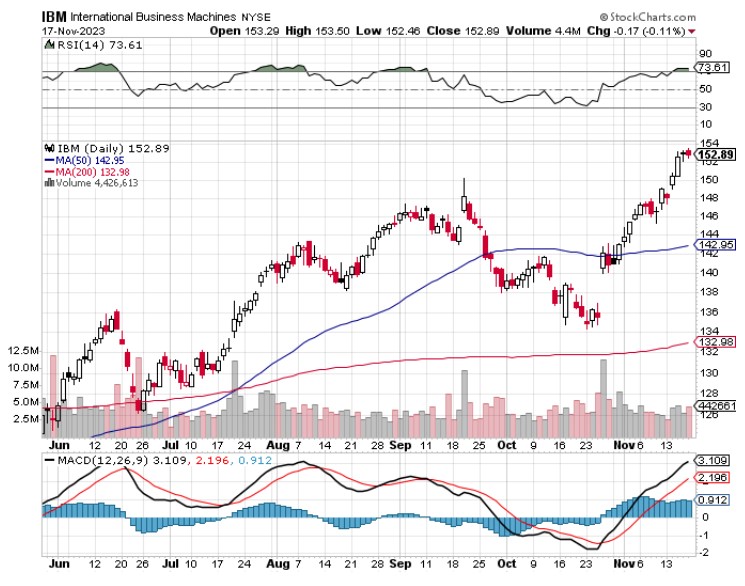THE FUTURE IS KNOCKING ON WALL STREET'S DOOR
(IBM), (QBTS), (RGTI), (ARQQ), (QUBT), (RTX)
Let's cut to the chase. The financial bigwigs on Wall Street, not exactly known for their tech-savvy leanings, are finally catching up with what some of us have known for years: Quantum computing isn't just science fiction; it's a game-changer.
Imagine a regular computer, but supercharged by the mind-bending laws of quantum mechanics. It's like the “Schrodinger's Cat” thought experiment, but for computers - where things can exist in multiple states at once. This isn't merely intriguing; it represents a monumental leap in computational capability.
For those with an eye on investments, this leap is not just a technological wonder; it signals a major shift in market dynamics.
Envision a world where complex problems, currently unsolvable by today's systems, are tackled in fractions of the time.
Despite quantum computing's significant strides in recent years, it still resembles a prodigious child in a research lab, not yet fully prepared for the commercial playground.
But it's rapidly evolving, becoming more accessible and cost-effective, thanks in part to advancements in cloud computing. In this quickly changing landscape, staying informed is vital.
As our digital universe and AI capabilities expand exponentially, the demand for computing power becomes insatiable.
After all, quantum computing is set to be a key player in this arena by the decade's end. But who are the main actors in this unfolding drama?
Well, you have the emerging contenders like D-Wave Quantum (QBTS) and Rigetti Computing (RGTI), challenging the established giants of the tech world.
In the software realm, companies like Arqit Quantum (ARQQ) and Quantum Computing Inc. (QUBT) are hard at work innovating.
For a broader investment approach, there's even a quantum computing ETF (QTUM) that offers exposure to this nascent industry.
Transitioning to the big boys, there’s International Business Machines Corporation (IBM).
A venerable figure in the tech industry, “Big Blue” has been flexing its muscles in the quantum computing domain.
These days, IBM Quantum is no longer just a concept; it's a tangible reality with actual quantum chips and systems available. In fact, this initiative has already attracted over 210 organizations from diverse sectors, eager to experiment with IBM's quantum solutions.
Their collaboration with Raytheon Technologies (RTX) for AI and quantum applications in critical areas like aerospace, defense, and intelligence, coupled with their ties to the U.S. government, underscores their capability and reach.
Notably, IBM's recent reveal of AI tools designed to regulate large language models signifies their strategic position in the AI landscape.
Their WatsonX AI software platform, a symbol of their commitment to advancing AI technology, also illustrates their leadership in AI governance.
With the launch of WatsonX.governance on December 5, IBM aims to ensure AI models are equitable, accurate, and transparent.
As global regulations around AI tighten, IBM positions itself at the forefront of this burgeoning market, striving to demystify the AI black box and make it more accountable.
For investors, this focus on AI accountability is not just a buzzword; it's the future of sustainable, profitable investment.
IBM's strategy clearly aims to bridge the gap between advanced research and commercial product development.
The evolving WatsonX suite, informed by insights from IBM Research, showcases a range of real-world applications and customer stories. IBM has identified primary applications for GenAI in areas like Digital Labor, Customer Care, and App Modernization. They're especially keen on helping companies transition from outdated COBOL code to modern programming languages using GenAI tools, a move that could revolutionize legacy systems.
Moreover, IBM's collaboration with the open-source community, particularly around the AI application framework tool Pytorch, exemplifies their commitment to enhancing model performance and broadening the computing architectures available for GenAI models.
Such initiatives open up new possibilities for a wider range of programmers to build or customize GenAI models, democratizing access to advanced AI tools.
In the realm of quantum computing, IBM is already recognized as a leader, thanks partly to its extensive work and public discussions about its innovations in this field.
Impressively, the company has outlined a detailed technology roadmap extending to 2030, a rarity in the tech sector. This level of transparency and long-term planning is unusual and speaks volumes about IBM's commitment to shaping the future of technology.
Taking all these into consideration, it’s clear that IBM, a century-old titan in the technology battlefield, is not just adapting to the future; it is actively redefining it in the realms of AI and quantum computing.
For the astute investor, keeping an eye on IBM's quantum and AI journey isn't only a good idea; it's a necessity in a world where technology and finance are increasingly intertwined.


